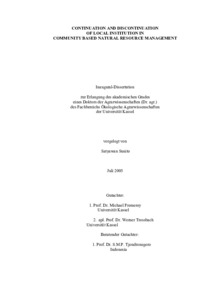Öffnen
Datum
2007-02-15Autor
Sunito, SatyawanSchlagwort
630 Landwirtschaft, Veterinärmedizin CelebesNationalparkNachhaltige EntwicklungRessourcenmanagementLokales WissenMetadata
Zur Langanzeige
Dissertation

Continuation and discontinuation of local institution in community based natural resource management
Zusammenfassung
Currently the push toward frontier areas, which until twenty years ago were still largely untouched by commercial agriculture, is taking place on a massive scale. This push is being driven not the least by global economic developments, such as the price increase of agriculture commodities like coffee and cocoa. In most cases the indigenous communities become trapped between the state monopoly in natural resource management and the competition for resources by external actors. In this processes the indigenous communities start to lose their access to resources. Another victim in this process is the environment where the natural resources are imbedded. International and national organizations working to conserve environment have became conscious of the important role that indigenous people could fulfill as partners in this endeavour. This partnership in struggle has produced a new discourse on the relationship between indigenous people and their environment. As a further consequence, programs were set up to develop what became known as Community Based Natural Resource Management (CBNRM) with its numerous variations. Based on a case study in a village on the eastern border of the Lore Lindu National Park in Central Sulawesi, this study questioned the basic assumption behind the concept of Community Based Natural Resource Management (CBNRM). Namely the assumption that communities living at the margin of forest are socially and culturally homogenous, still more or less egalitarian, and basically living in harmony with their natural environment. This study was inspired by the persistent critique – although still a minority – on the basic assumption the CBNRM from academicians and practitioners working through the Entitlement perspective. Another inspiration was the mounting critique toward the participatory approach. In its effort the study explore further the usefulness of certain approaches. One of the approach much relied on in this study was the local history of the community studied, through exerting oral and local written documents on local history, legends and local stories. These sources proofed quite capable in bringing the local history into the light. Another was the actor oriented approach, which later came to be supported by the concept of Social Pool Resources. The latter concept proofed to be useful as analytical instrument to integrate social institutions and the common pool resources, as a field of action for the different actors as human agencies.
Sammlung(en)
Dissertationen (Institut für soziokulturelle und sozioökonomische Studien (ISOS) (aufgelöst))Zitieren
@phdthesis{urn:nbn:de:hebis:34-2007021517219,
author={Sunito, Satyawan},
title={Continuation and discontinuation of local institution in community based natural resource management},
school={Kassel, Universität, FB 11, Ökologische Agrarwissenschaften},
month={02},
year={2007}
}
0500 Oax
0501 Text $btxt$2rdacontent
0502 Computermedien $bc$2rdacarrier
1100 2007$n2007
1500 1/eng
2050 ##0##urn:nbn:de:hebis:34-2007021517219
3000 Sunito, Satyawan
4000 Continuation and discontinuation of local institution in community based natural resource management / Sunito, Satyawan
4030
4060 Online-Ressource
4085 ##0##=u http://nbn-resolving.de/urn:nbn:de:hebis:34-2007021517219=x R
4204 \$dDissertation
4170
5550 {{Celebes}}
5550 {{Nationalpark}}
5550 {{Nachhaltige Entwicklung}}
5550 {{Ressourcenmanagement}}
5550 {{Lokales Wissen}}
7136 ##0##urn:nbn:de:hebis:34-2007021517219
<resource xsi:schemaLocation="http://datacite.org/schema/kernel-2.2 http://schema.datacite.org/meta/kernel-2.2/metadata.xsd"> 2007-02-15T11:02:33Z 2007-02-15T11:02:33Z 2007-02-15T11:02:33Z urn:nbn:de:hebis:34-2007021517219 http://hdl.handle.net/123456789/2007021517219 4210540 bytes application/pdf eng Urheberrechtlich geschützt https://rightsstatements.org/page/InC/1.0/ Local history Social differentiation Natural resource management Participation 630 Continuation and discontinuation of local institution in community based natural resource management Dissertation Currently the push toward frontier areas, which until twenty years ago were still largely untouched by commercial agriculture, is taking place on a massive scale. This push is being driven not the least by global economic developments, such as the price increase of agriculture commodities like coffee and cocoa. In most cases the indigenous communities become trapped between the state monopoly in natural resource management and the competition for resources by external actors. In this processes the indigenous communities start to lose their access to resources. Another victim in this process is the environment where the natural resources are imbedded. International and national organizations working to conserve environment have became conscious of the important role that indigenous people could fulfill as partners in this endeavour. This partnership in struggle has produced a new discourse on the relationship between indigenous people and their environment. As a further consequence, programs were set up to develop what became known as Community Based Natural Resource Management (CBNRM) with its numerous variations. Based on a case study in a village on the eastern border of the Lore Lindu National Park in Central Sulawesi, this study questioned the basic assumption behind the concept of Community Based Natural Resource Management (CBNRM). Namely the assumption that communities living at the margin of forest are socially and culturally homogenous, still more or less egalitarian, and basically living in harmony with their natural environment. This study was inspired by the persistent critique – although still a minority – on the basic assumption the CBNRM from academicians and practitioners working through the Entitlement perspective. Another inspiration was the mounting critique toward the participatory approach. In its effort the study explore further the usefulness of certain approaches. One of the approach much relied on in this study was the local history of the community studied, through exerting oral and local written documents on local history, legends and local stories. These sources proofed quite capable in bringing the local history into the light. Another was the actor oriented approach, which later came to be supported by the concept of Social Pool Resources. The latter concept proofed to be useful as analytical instrument to integrate social institutions and the common pool resources, as a field of action for the different actors as human agencies. open access Sunito, Satyawan Kassel, Universität, FB 11, Ökologische Agrarwissenschaften Fremerey, Michael (Prof. Dr.) Trossbach, Werner (apl. Prof. Dr.) Tjondronegoro, S. M. P. (Beratender Gutachter) Celebes Nationalpark Nachhaltige Entwicklung Ressourcenmanagement Lokales Wissen 2005-09-28 </resource>
Die folgenden Lizenzbestimmungen sind mit dieser Ressource verbunden:
Urheberrechtlich geschützt

